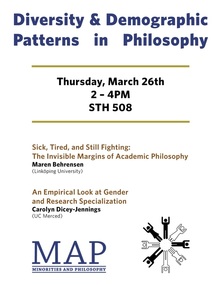|
Each week this summer, we'll be highlighting exciting MAP events from the last academic year. This week, Boston University Representative Stacey Goguen tells us about their colloquium on diversity and demographic patterns.  BU Colloquium on Meta-Philosophy: Diversity & Demographic Patterns in Philosophy BU's MAP chapter invited two philosophers to speak about the profession and current demographic issues that they find pressing. Maren Behrensen (whose work includes the ethics of immigration and technology, gender testing in sports, and how romantic love is or is not like patriotism) shared her thoughts about the profession of philosophy in the wake of Peter Railton's Dewey Lecture at the 2015 Central APA meeting. She discussed the various ways philosophers may struggle with depression. She also argued that it was important (and brave) for philosophers like Railton to talk openly about their struggles, though she cautioned us not to take his narrative as the representative one. Perhaps most importantly, we should target the sort of stigma and bias that make it currently dangerous for some philosophers to be open and up front about their mental health. But there are other factors, too, that lead philosophy to becoming a sort of "depression machine." She then dipped into some later Wittgenstein to discuss how issues of mental health can be tied up with the naturalization of learned skill sets - i.e., how the self-conception of the profession can make you feel inadequate because it relies on the notion that success equals talent. Carolyn Dicey Jennings (whose main area of research is in the philosophy of mind and cognitive science, with a secondary research interest in demographic patterns in the profession) presented some preliminary findings: "The first part of the talk is based on a collaborative project with Eric Schwitzgebel. Our research question is whether women and men tend to specialize in different areas of philosophy. In this talk, I will present some initial findings on this question through analyses of three separate databases. The second part of the talk examines both potential sources and prospective applications of these findings. On the side of potential sources, I will be discussing a few alternative hypotheses that aim to explain the source of gender differences in research specialization, including the work of my graduate student, Yuliya Chernykhovskaya, who is currently testing one of these hypotheses. On the side of prospective applications of this research, I will discuss the efforts we have taken at UC Merced to promote diversity in our philosophy program and some initial results of these efforts."
0 Comments
Leave a Reply. |
NEWSUpdates on MAP and MAP-related happenings.
Please contact us here for suggestions, comments, or job postings. Archives
December 2023
Categories |
|
MAP is generously supported by the Marc Sanders Foundation and the Philosophy of Science Association.
|

 RSS Feed
RSS Feed